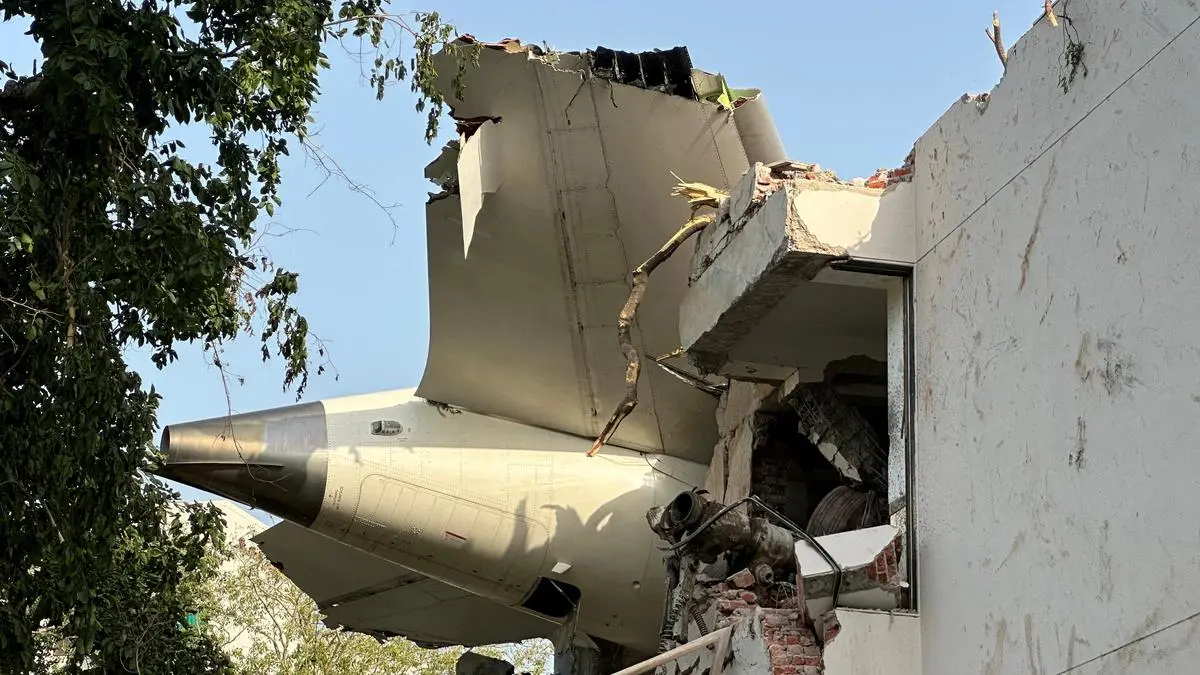Air India Plane Crash: Ex‑Gujarat CM Vijay Rupani Among 169 Indians, 53 Britishers
On June 12, 2025, the nation woke up to heartbreaking news—a tragic crash involving Air India Flight AI 171 shortly after takeoff from Ahmedabad. The aircraft, a Boeing 787‑8 Dreamliner en route to London Gatwick, was carrying 242 people, including 230 passengers and 12 crew members. What was meant to be a routine international flight quickly turned into one of India’s deadliest aviation disasters in recent memory.
The Crash and Its Immediate Impact
Flight AI 171 had just taken off from Ahmedabad’s Sardar Vallabhbhai Patel International Airport when it began experiencing critical issues. Just under two minutes into the flight, it failed to gain altitude beyond 625 feet and crashed into a densely populated area, including the hostel building of BJ Medical College. A loud explosion followed by fire and thick black smoke shocked local residents, who initially thought it was an earthquake or a gas blast.
Tragically, over 200 passengers lost their lives, including several individuals on the ground. Emergency responders were quick to arrive, but the intensity of the crash and the subsequent fire made rescue efforts difficult. Only one passenger from the aircraft has survived and is currently being treated under intensive care. The death toll on the ground is still being verified but includes multiple students and hostel staff.
Vijay Rupani Among the Victims
One of the most shocking revelations from the passenger manifest was the name of Vijay Rupani, former Chief Minister of Gujarat. The senior BJP leader, 68, was traveling with his wife and a personal assistant for a scheduled family visit and public event in the UK. His presence on board brought the tragedy into sharper national focus.
Known for his leadership from 2016 to 2021, Vijay Rupani’s calm, methodical political style and dedication to public service had earned him admiration across party lines. His loss has sent shockwaves throughout the political landscape, with tributes pouring in from current and former leaders alike.
A Global Human Tragedy
The flight carried 169 Indian citizens and 53 British nationals, along with travelers from Canada and Portugal. Families from both countries are now grappling with immeasurable grief. For many, this was their first overseas trip for education, work, or vacation. A significant number of students, including Telangana youth flying from Hyderabad to connect to London, were also on board. Their stories, now emerging on social media, speak of dreams cut short.
The crash also affected the lives of dozens on the ground. Students in the hostel, many from rural Gujarat and neighboring states, were caught completely unaware. Survivors describe scenes of chaos, with fire tearing through dorm rooms and emergency exits blocked by debris.
Investigation and Rescue Operations
Multiple agencies, including local police, NDRF, CISF, and Indian Army units, were quickly mobilized. Civil aviation officials confirmed that the flight issued a Mayday shortly after takeoff, indicating technical difficulties. Investigators are now combing through the aircraft’s black boxes and maintenance records.
The initial signs point toward a possible mechanical malfunction—either in the landing gear or fuel system. Boeing engineers and aviation safety experts are on the ground, working alongside Indian authorities to determine the cause.
Given the international nature of the flight, global aviation watchdogs from the UK and US are expected to join the probe. This includes the UK’s Air Accidents Investigation Branch and American aviation safety boards, since the aircraft model was manufactured by Boeing with GE Aerospace engines.
Emotional Fallout and National Mourning
The crash has deeply impacted the nation. From political leaders and celebrities to ordinary citizens, condolences have poured in. Vigils were held in Ahmedabad, Delhi, Hyderabad, and London. In Telangana, several students from Warangal, Karimnagar, and Hyderabad were reportedly on board, prompting a wave of grief across the state.
Parents who had dropped off their children for the flight are now being consoled by relatives at the airport’s waiting lounge, which has turned into a grief center. Mental health counselors and grief response teams have been dispatched to assist bereaved families.
The Telangana government has offered support to affected families from the state, promising financial aid, legal help, and a dedicated helpline. Meanwhile, community groups in Hyderabad are organizing blood donation camps and candle marches in solidarity.
Questions Raised About Aviation Safety
This crash has once again brought attention to airline safety, especially in Indian skies. The Boeing 787 Dreamliner had previously been considered one of the safest long-haul aircrafts. However, concerns are now being raised about the fleet’s maintenance standards, regulatory oversight, and the quality of emergency training provided to crew.
Families of victims are also demanding answers about the aircraft’s flight readiness and whether pre-flight inspections missed any red flags. Civil aviation authorities have assured the public of a thorough and transparent investigation.
Remembering the Faces Behind the Numbers
Beyond the headlines and the statistics are countless personal stories. A young couple from Hyderabad, recently married, were flying to London for their honeymoon. A British professor returning home after a month-long sabbatical in India. An elderly couple heading to see their grandchildren for the first time. A Telangana-based engineering student traveling for his final semester in the UK.
Each of them had a story, a future, and people waiting for them. The loss is not just numerical—it is emotional, generational, and irreplaceable.
The Road Ahead
As rescue operations continue and authorities prepare for DNA identification and repatriation of remains, the country finds itself in collective mourning. A national condolence ceremony is expected in the coming days. Political leaders across party lines have called for airline audits and stricter safety regulations.
The aviation industry, too, faces its own moment of reckoning. With global scrutiny and mounting public pressure, accountability will be crucial—not just for justice, but for preventing such a tragedy from ever happening again.




